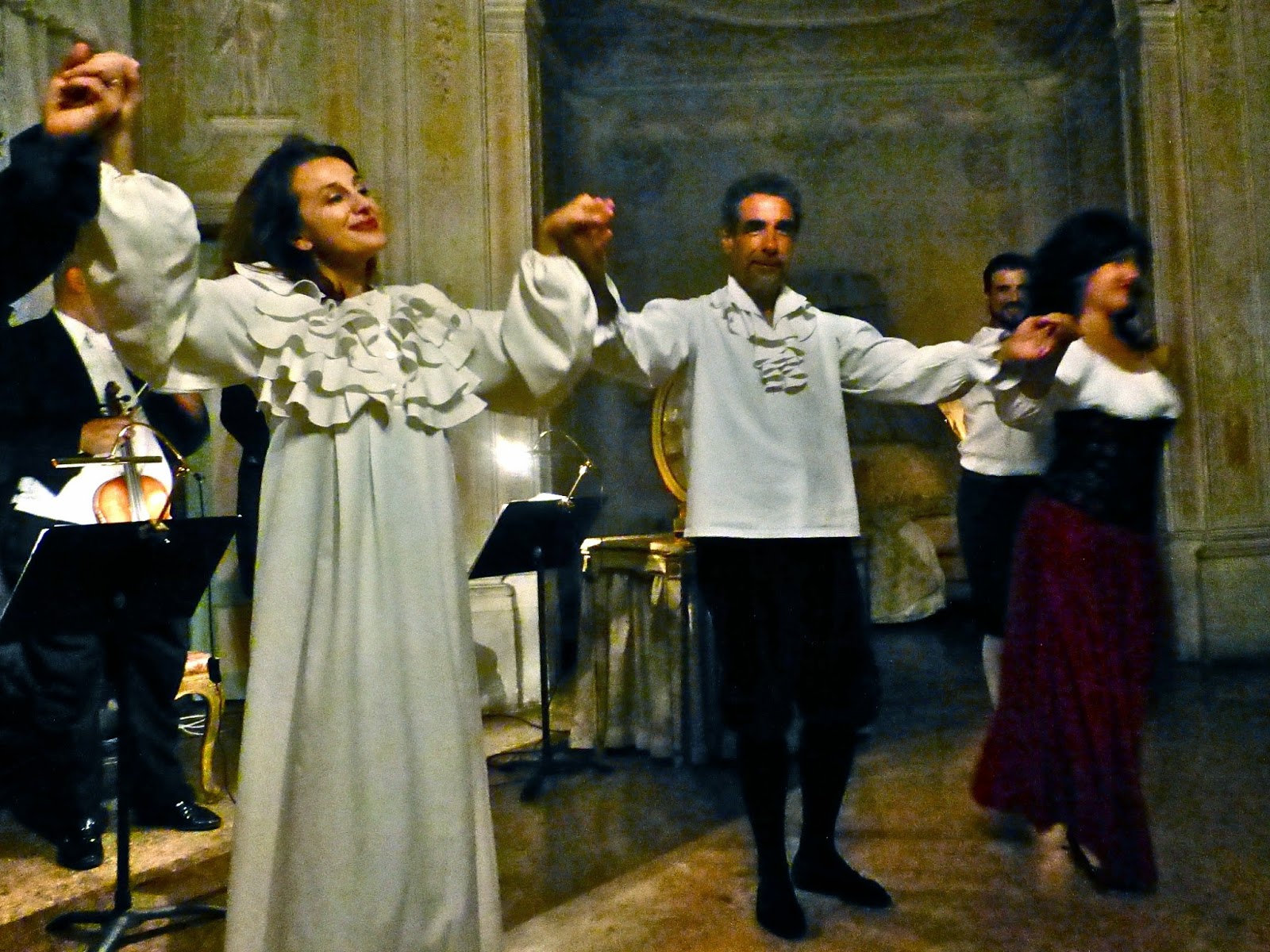Sometimes, when you least expect it, something extraordinary happens.
 |
| Verdi |
That
was the case with a performance of Verdi's Rigoletto, the
court jester to a 16th Century Duke of Mantua, staged in
an old palazzo in Venice. Like most of Verdi's operas, Rigoletto
is a tragedy in the Greek sense of the word—the hunchbacked
protagonist has a fatal flaw (an acid tongue) that leads inexorably
to a tragic end. It's a story of blowback—malediction and revenge
... and some beautiful music that makes the tragedy, if not
acceptable, at least bearable.
But
why was this performance something unexpectedly delightful?
 |
| Palazzo Barbariga Minoto - square of light in background |
We
learned about something called “Musica a Palazzo” while searching
for music options in Venice on the Internet while we are here. My
first thought was that it was some kind of tourist trap putting on
inferior music in powdered wigs as you can often find in Vienna. We
searched out the venue one day, the Palazzo Barbarigo Minoto, and
found that it was in an obscure alley with no indication that there
was anything going on there. Since we were already there, I decided
to walk the short distance down the alley and, luckily, bumped into a
man coming out of a door who acknowledged that this was, in fact, the
venue for “Musica a Palazzo” when I asked him.
 |
| entrance hall |
We
decided to give it a try and discovered that getting tickets could be
a rather complex affair. There are a couple of ways to get tickets.
One is simply to use a ticketing agency and pay 78 Euro for a one-off
ticket by credit card—the easy route. The other is to fill out a
membership application for 70 Euro (you can either download one and
print it out, or you can fill one out at the box office before the
performance), and pay in cash. We downloaded and filled out the
application at home and saved time at the box office. The astonishing
thing, we discovered, is that a membership of 70 Euro allows you to
attend other performances at no extra cost.
 |
| audience members awaiting the start of the performance |
The
opera, cut to fit the venue, is staged in three rooms of the palazzo
with the small (around 50 people) audience sitting right in the room
with the 4-piece ensemble and the singers. It is a unique experience
of being not just at the opera, but, in a sense, in it. The audience
members can be used to fill in for the large number of chorus and
extras that you would normally find in a conventional opera house.
So, that, for example, the baritone in the title role, sang directly
to a man in the audience as if he were a character (Marullo) in the
opera.
 |
| Rigoletto - the baritone |
The
word that echoes in my mind as I recall the experience of being “in
the opera” is “intense”. The relatively small size (it is a
palazzo, after all) of each room and the intimacy of close proximity
to the performers forces you to feel the emotion and passion at an
almost intolerably close range—like being caught in a crossfire I
imagine. The ensemble (piano and three strings) were superb in
adapting what is an orchestral score that left nothing lacking in the
lyricism and drama of Verdi's music. And, the baritone (whose name I
don't know, they don't publish the names of the cast) was one of the best
Rigoletto interpreters I've heard—a superb actor wed to a rich
warm-toned yet powerful voice, versatile in its range from mockery to
pity and pleading and, ultimately, despair at the murder of his own
daughter. A thoroughly moving and shattering performance by a true
yet unsung artist.
There
is a short intermission at which guests are encouraged to sample the
wine (at no extra cost) and enjoy the evening view of the Grand Canal
from the windows. You can see the Peggy Guggenheim Collection across
the canal and, if you lean out a bit, you can see the floodlit Santa
Maria de la Salute church on your left.
 |
| bass and soprano |
 |
| cast doing their bows - soprano, baritone, mezo-soprano, tenor (behind) |
 |
| at Musica a Palazzo |
If
you like good music and drama, you won't go wrong to give Musica a
Palazzo a visit and you will experience something different from
the classic opera house. Since we have a membership we plan to attend
the rest of the shows in the repertoire, all for the price of 70
Euros. Going to see Verdi's La traviata today. It's one of the best deals in Venice.














































